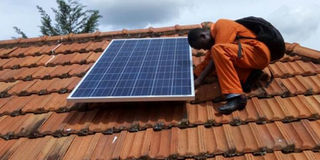Murchison Falls: Govt should shift attention to solar energy

Uganda is richly endowed with abundant energy resources, which are fairly distributed across the country, including an average of 5.1 kWh/m2 of solar energy.
The level of utilisation of solar energy is still very low requiring increased use of solar PV systems in rural areas as a way of improving rural electricity access. This can make energy access easy for refugee camps, rural health centres, rural schools, and information, communication and technology centres such as radio stations, Internet centres, among others, which in turn can rapidly spur business development and improve lives of local communities.
This can be proved in a number of villages where communities started up saving schemes and are already supplying themselves with Solar PV systems and their lives have improved. Access to the national grid is at 26 per cent, given all the heavy investments that have been made on this front, and 24 per cent access for off-grid electricity.
Therefore, more attention should be put in improving off-grid energy access such as use of solar PV systems that are cheaper. More feasibility studies should be undertaken on harnessing cheaper energy sources like solar given that many places in Uganda are rural characterised by poor people who cannot afford power generated from Uganda’s hydroelectricity dams. This is in spite of the fact that the demand for power is growing at 10 per cent per annum.
This implies that continuous development of renewable energy sources, which are cheaper, can easily be accessed.
On December 2 last year, Cabinet agreed that a feasibility study be undertaken on the Uhuru Falls site where government already has a memorandum of understanding with South Africa firm, Bonang Energy and Power Limited Company.
This comes at a time when the current total installed capacity of electricity in Uganda stands at 1182.2MW, but this is not reflected in the lives of the majority poor.
The rich are also still grappling with increased use of charcoal as cooking fuel, evidenced by increasing prices of charcoal and high rate deforestation.
The country has for years also been facing challenges of payment of unutilised power from our expensive dams. A recent example being that of Achwa dam, where taxpayers, many of whom lack electricity, are paying Shs13m per hour. This is caused by lack of capacity by government to distribute this power.
With the scenarios above, there is no way we are going to achieve the Sustainable Development Goal 7 of ensuring access to affordable, reliable, sustainable and modern energy for all. If we do not explore cheaper renewable energy sources like solar that are affordable, then we shall have failed our people.
[email protected]




